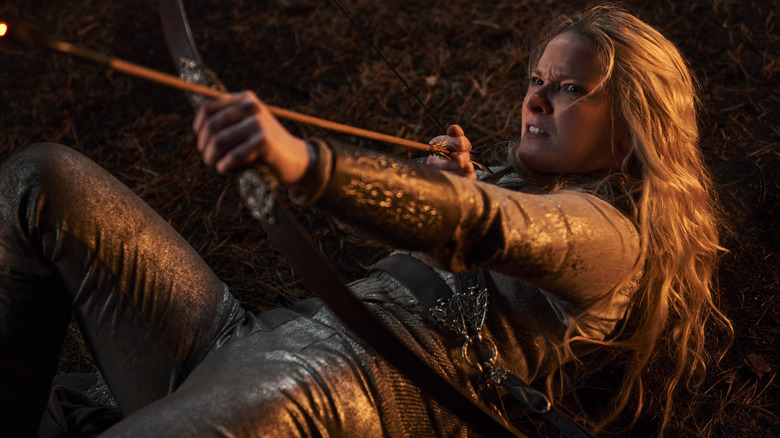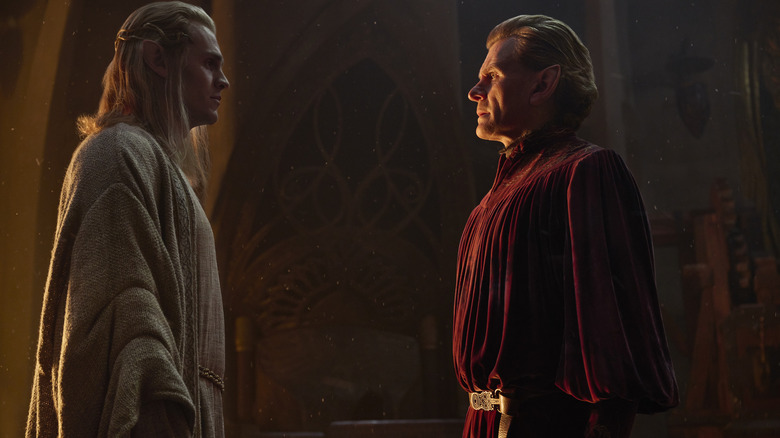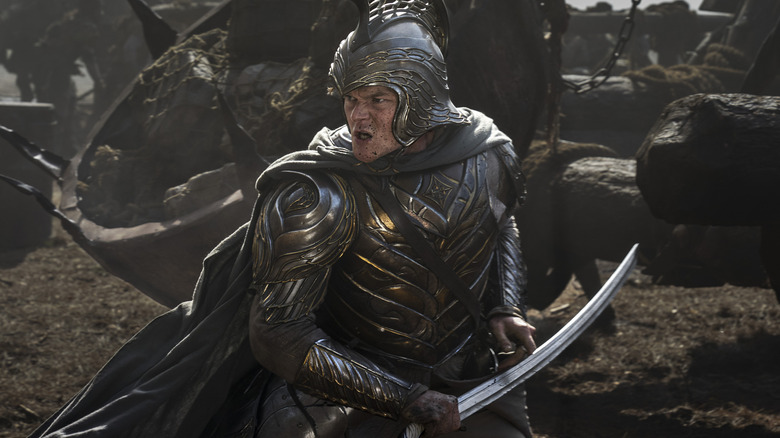The Lord Of The Rings: The Rings Of Power Season 2 Review: A Darker, Bolder, & More Complex Return To Form
"I have many names," the con artist formerly known as Halbrand sneers on multiple occasions throughout season 2 of "The Lord of the Rings: The Rings of Power." It's a recurring statement that has the added bonus of putting J.R.R. Tolkien's most famous villain, the Dark Lord Sauron, at the forefront of the action. But the larger question of what, exactly, is in a name has dogged every step of production on this Prime Video series since the moment it was first announced. The first batch of episodes didn't exactly quell many concerns upon release in late 2022 about a mega-corporation leveraging the franchise brand to take expanded material (adapted not from any specific novel, but from the appendices located in "The Return of the King" novel) and construct an entire narrative out of spare parts. The overall result was a promising, if uneven debut that provided tantalizing hints of a show that could, someday, live up to the full potential of Tolkien's beloved fantasy universe.
Two long years later, that day feels closer than ever before with "The Rings of Power" season 2, a darker, bolder, and more complex story in every way. Where the first season struggled to integrate its sprawling ensemble or find much of a thematic link between disparate storylines on a weekly basis, these eight episodes (all of which were screened early for critics to review) are a marked improvement in arguably the most oft-repeated criticism (the ones not made in bad faith, at least) from season 1 — the writing. This time around, extraneous characters are ruthlessly written out, unwieldy subplots have been streamlined or trimmed, and we often go entire episodes without forcing visits to certain protagonists or places, all to the benefit of a much stronger and more focused season. Showrunners J.D. Payne and Patrick McKay return to shepherd this sophomore effort, backed by a writer's room including Gennifer Hutchison, Jason Cahill, Helen Shang, Glenise Mullins, Nicholas Adams, and Justin Doble. And while they've insisted past reactions haven't influenced present results, it's abundantly clear that the creative team refused to rest on their laurels, either.
Though it doesn't quite reach the heights of Tolkien's original novels or Peter Jackson's adaptations, "The Rings of Power" feels like the next best thing: a confident, thrilling, and gloriously nerdy return to Middle-earth.
Season 2 is a villain-centric tragedy
"The Rings of Power" has taken its fair share of lumps for straying from the exact text of Tolkien's writing — an inevitability for an adaptation condensing literally thousands of years of lore into a cohesive story — but the series remains staunchly faithful to the author's spirit. To wit, this surprisingly dark second act of the story is a slow-motion tragedy in the making. Where season 1 began from the perspective of the elf warrior Galadriel (Morfydd Clark) and her origin in a land eternally bathed in light, season 2 takes the exact opposite approach with a shadowy prologue detailing Sauron's rise after his master Morgoth's fall. This hauntingly rendered vignette might as well be a statement of intent for the episodes to come, redirecting the focus squarely on its central antagonist(s) and further emphasizing Galadriel and Sauron (Charlie Vickers) as fractured reflections of one another. And even when we return to the present, picking up mere moments after the season 1 finale, an impending sense of doom permeates every corner of Middle-earth.
Ironically, this bleaker tone allows the cast and characters to shine brighter than ever. Where the first season waded through a lot of preamble to get to its eponymous rings, season 2 immediately puts those objects of power centerstage. Our main duo of Elrond (Robert Aramayo) and Galadriel are at a crossroads regarding the use of the three forged in the finale. Does the risk of Sauron's possible influence poisoning the only hope of saving their people outweigh their potential salvation? The cautious Elrond certainly thinks so and finds himself completely at odds with the ever-stubborn Galadriel, a shrewd choice that adds far more depth to their dynamic and injects a constant source of momentum that carries over to various other arcs, as well. Similarly, Prince Durin (Owain Arthur) and Princess Disa (Sophia Nomvete) walk their own path as the gifting of seven dwarven rings promise a solution to their realm's problems, though at a precious cost. Even in the farthest-flung plot, following the Harfoot Nori (Markella Kavenagh) and The Stranger (Daniel Weyman) (and, eventually, Rory Kinnear as the utterly delightful Tom Bombadil) in the desert of Rhûn, the threat of Sauron and rumors of a possible ally (Ciarán Hinds' mysterious "Dark Wizard") hang heavy overhead and further connects them to the broader conflict.
But as genuinely great as Clark's icier turn as Galadriel and Aramayo's righteously indignant take on Elrond are in particular, it's the steadily-unfolding psychodrama between the great craftsman Celebrimbor (Charles Edwards) and Sauron (disguised as an emissary of the gods named Annatar — and, yes, it's neatly explained why the former would be fooled by the latter's elf ears and wig) which succeeds best as the spine holding together the entire season. Hardcore purists and casual fans alike will make a feast out of all the Biblical imagery and operatic storytelling at play, cutting to the heart of Tolkien's most compelling tragedy. Nowhere does "The Rings of Power" truly live up to its lofty standards than when it returns to this season-long arc, a fantasy-fueled stage play that elevates Vickers and Edwards among the most commanding performances of the entire franchise and that, despite yourself, might have you rooting for the villain.
The Rings of Power is an imperfect improvement
For a series that represents quite possibly the most expensive investment ever made in this streaming era, "The Rings of Power" legitimately couldn't afford to allow any more growing pains to hold itself back. The fact that it doesn't is largely a product of that oversized budget manifesting on-screen more tangibly than before. We still get plenty of those epic vistas, sweeping landscape shots, and nifty map transitions that the public now associates with "The Lord of the Rings," though this time they're integrated with the practical sets and lived-in environments and copious amounts of seamless VFX work as smoothly as ever. The directing team of Charlotte Brändström, Louise Hooper, and Sanaa Hamri don't redefine the look and feel of Middle-earth so much as they refine it, taking a largely invisible approach to capturing the show's specific conception of the world while keeping it consistent with Peter Jackson and the late cinematographer Andrew Lesnie's efforts. Brändström's direction of the biggest battle sequence(s) of the season deserves a special shoutout, blowing last season's skirmish in the Southlands out of the water. And, of course, all of these visuals are enhanced by composer Bear McCreary's brilliant score, a worthy successor to Howard Shore's iconic work on the original movie trilogy, weaving together familiar leitmotifs and themes to keep us grounded in emotion every step of the way.
Thankfully, all this attention to technical detail means that even some of the more distracting flaws scattered throughout season 2 don't put too much of a damper on things. As much as the writers seem to have a better grasp on pacing and story structure, some old habits leftover from earlier episodes make like Sauron and prove difficult to fully die. The Númenórean arc takes some big swings, some of which are executed more questionably than others (like a politics-heavy plot featuring an attempted coup), but it can't help but feel lost at sea (if not an outright slog) without familiar faces like Galadriel or even Halbrand keeping us invested. But it's the handling of characters like Isildur (Maxim Baldry), Arondir (Ismael Cruz Córdova), and Theo (Tyroe Muhafidin) that fares most poorly — a product of characters who have clearly overstayed their narrative usefulness or are stuck spinning their wheels for more important developments in the future. To put it another way, these issues hit a nadir in the lackluster third episode and only improve from there ... which perhaps explains why Amazon bundled the first three together in one supersized premiere.
It's to the show's credit, however, that even these strained setbacks don't completely dull the season's sharp edge. Whenever these minor missteps threaten to derail the proceedings, we're whisked away on episodic adventures filled with monstrous creatures from Tolkien's bestiary or refreshingly lighthearted bursts of earnest sincerity or stirring songs telling tales of tragedy and whimsy. (Trust me, Bombadil fans, you won't be disappointed.) And through it all, the irresistible allure of Sauron's scheming all but reaches through the screen and grabs us viewers by the throat. The Dark Lord might go by many names, but season 2 is the moment when "The Rings of Power" officially makes one for itself.
/Film Rating: 7 out of 10
"The Lord of the Rings: The Rings of Power" premieres its first three episodes August 29, 2024, and new episodes stream on Prime Video every Thursday until October 3, 2024.


